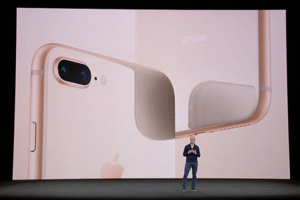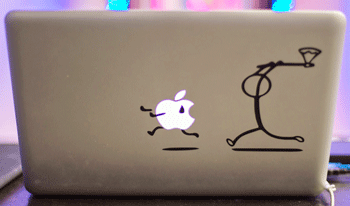Analysis: “Incremental” is not what Apple fans were waiting for
(Update to “Apple’s future hangs in the balance” column from August 17)
_____________________________________________________________________________
By Jeffrey I. Cole
Update — September 13: In one of the most anticipated products launches ever, Apple has introduced its new lineup of iPhones. It’s worth pausing for a moment to consider: with what other company has there ever been so much interest and attention before the product was even launched?
Apple is in a class by itself.
 In an earlier column (see below) I made the case that what Apple fans really wanted to see was Tim Cook in a pair of jeans on stage at the Moscone Center coming to the end of his presentation and, almost as if he forgot, saying, “Oh, and one more thing.” Then he’d introduce the phone that would change their lives.
In an earlier column (see below) I made the case that what Apple fans really wanted to see was Tim Cook in a pair of jeans on stage at the Moscone Center coming to the end of his presentation and, almost as if he forgot, saying, “Oh, and one more thing.” Then he’d introduce the phone that would change their lives.
Cook got everything right– except the game changer.
Actually, the location has been forever shifted from Moscone Center to the Steve Jobs Theater at the impressive new Apple Park in Cupertino. Cook began the session with a well-done tribute to Jobs and the Jobs legacy, a legacy that loomed over the event.
Apple introduced three new iPhone models: the 8, the 8+ and the X (pronounced “ten”). Most press attention has focused on the iPhone X breaking the $1,000 barrier, although few customers will actually pay that much up front: most will spend approximately $50 a month (whether to Apple or their mobile carrier) on an installment program.
The iPhone X is one of Apple’s most impressive incremental improvements. Unfortunately, “incremental” was not what fans were waiting for. The new phones boast better infinity screens, facial recognition and wireless charging: all features that have been available on Samsung’s phones for as long as two years.
Apple also made some interesting advancements in augmented reality (AR) that may ultimately prove to be an important differentiator for the iPhone as it is further developed. For now, it’s too early to tell where Apple is going with AR.
What came closer to being a game changer (or at least much more than an incremental improvement) is Apple’s third series of the Apple Watch. Even though the first version of the Apple Watch quickly became the best smartwatch out there, Apple fans never put it in the game changer category of the iPod, iPhone and iPad.
The company got closer to that target today by untethering the Apple Watch from its Bluetooth connection to the smartphone. The new version can satisfy runners who want the benefits of the smartphone without bulk because the new Apple Watch has its own cellular connection. That — coupled with more and improved health and fitness applications — makes the Apple Watch more attractive.
Even though Apple missed the game-changer level today, it isn’t fair to hold the company to that standard. After all, how many companies — besides Apple — have ever created more than one game-changing device?
Despite Apple’s reputation for regularly pulling rabbits out of its hat being somewhat diminished, sales of the new products will still be spectacular. Fans will line up, fork over their money and be satisfied with a terrific new phone.
And, as for game changing, there is always the iPhone 11.
____________________________________________________________________________________
Can the world’s most valuable company deliver another game-changing device with the iPhone 8, or will its star finally fade?
By Jeffrey I. Cole
August 17 — You would have to dive deep into business books to find a CEO at any company at any time in history who has faced a bigger challenge than Tim Cook at Apple faces right now.
 Last fall, Cook announced the introduction of the iPhone 7. Fans learned that it would have a slightly better camera and a slightly improved processor, and they were profoundly disappointed.
Last fall, Cook announced the introduction of the iPhone 7. Fans learned that it would have a slightly better camera and a slightly improved processor, and they were profoundly disappointed.
In fact, the iPhone 7 was an impressive incremental improvement, but that’s all it was. Apple fans (or fanatics for these purposes) wanted another game changer — even though they had no idea what game they wanted changed. They wanted a product that would dazzle and thrill them, fixing a problem they didn’t even know existed. Creating solutions for problems that didn’t exist was what Steve Jobs had in mind when he would quote Henry Ford as having quipped, “If you asked my customers what they wanted, they would have said a faster horse.” (By the way, Ford probably never really said this.)
What it came down to is this: they wanted to see Tim Cook in a pair of jeans and a black turtle-neck sweater on stage at the Moscone Center in San Francisco coming to the end of his presentation and, almost as if he forgot, remembering, “Oh, and one more thing,” and then introducing the product or feature that would change the world.
Apple under Steve Jobs had already introduced three products that did change the world: the iPod and iTunes in 2003, the iPhone in 2007, and the iPad in 2010. That is an achievement that has only been equaled by Edison over the past 150 years and, perhaps Elon Musk (the Edison of the 21st century today).
However, none of Steve Jobs’ “game-changers” were invented by Apple. What Apple was incomparable at doing was making technology that already existed sleek, elegant and cool.
When the iPod was introduced there were many mp3 players on the market. But unlike the others, the iPod was beautiful and easy and fun to use. It towered over the rest. By the time the iPhone came along, there were other smartphones available (the Blackberry and the Palm Treo for two examples), but none were as beautifully packaged or integrated as the iPhone. When the iPad appeared, tablets had been available for at least 10 years, but none were clean, simple and easy to use as the iPad.
No one could take existing technology and make it as simple and easy to use as Apple. Our work shows 50% of three year-olds are online, as well as healthy percentages of one and two-year-olds. They are not on Facebook or using Excel spreadsheets: they are using iPads.
Why the Apple Watch is different
Apple’s main innovation since the death of Steve Jobs has been the introduction of the Apple Watch. It was significant that Apple chose to name it the Apple Watch rather than the iWatch. When asked why not the iWatch, Apple provides no conclusive answer but hints that the change in terminology is to distinguish the Steve Jobs era from that which follows.
It is puzzling why Apple would want to distinguish the company from its greatest legend.
_________________________________________________________________________________________________
The iPhone 7 was an impressive incremental improvement, but that’s all it was. Apple fans (or fanatics for these purposes) wanted another game changer — even though they had no idea what game they wanted changed. They wanted a product that would dazzle and thrill them, fixing a problem they didn’t even know existed.
_________________________________________________________________________________________________
The Apple Watch continues the tradition of taking an existing technology (there have been smart watches for quite a while) and making it better than anything else. The Apple Watch is the best smart watch ever made. But its small battery and need to be tethered to a smart phone via a Bluetooth connection have made it less than a game-changer. As a result, its sales and impact have not equaled the earlier breakthroughs.
Last fall when Apple fanatics were disappointed that the iPhone 7 only had a better camera and processor, they quickly pivoted and pointed out that September of 2017 is the 10th anniversary of the iPhone. They argued, “Apple is saving the really great stuff for the iPhone 8 on the tenth anniversary.” Maybe they are right.
We’ll see what the future holds next month
When the iPhone 8 is announced next month, if it merely has a slightly better camera and processor — and perhaps some features such as wireless charging that Samsung has had for years — the fanatics will be profoundly disappointed.
On the other hand, if it introduces new features or capabilities that fans don’t know they want — augmented reality is rumored to be high on that list — but that dazzle them, the love affair with Apple will go on.
The future of the company does not depend on the iPhone 8. Apple has enough mobile contracts in place to stay the world’s highest valued (or close to it) for a while.
What is at risk with the introduction of the iPhone 8 is Apple’s reputation with its fans for innovation and being far ahead of its competitors. If all the fans see is an incremental improvement, then Apple becomes just another successful technology company, but one that is no longer the most interesting and loved company in the world. Apple will probably have to look for game-changers in other areas such as cars or television.
If the new phone does shock and awe the fanatics, then that will strengthen Tim Cook’s connection to the Jobs Era.
The stakes have never been higher.
__________

Jeffrey Cole is the founder and director of the Center for the Digital Future at USC Annenberg.
See all Analysis columns.
August 17, 2017

